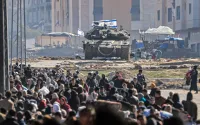7 December 2004
 Mr Qualls says he had to stay in Iraq longer than expected |
With US forces stretched by deployments in Iraq and Afghanistan, many units have been ordered to stay on longer than originally expected.
Soldiers have been kept abroad even if the date they were due to leave the army has passed.
The soldiers, seven of whom have stayed anonymous, are believed to be the first active-duty personnel to sue the army.
Lawyers for the men have teamed up with the Center for Constitutional Rights, a liberal public interest group, to launch a class action lawsuit calling for an end to the practice known as "stop loss".
The plaintiffs say thousands of service personnel have been kept in Iraq and Afghanistan beyond their discharge or retirement date.
The army confirmed that about 7,000 soldiers at any one time are affected by the stop-loss policy, which can keep troops committed to their units for 18 months beyond their discharge date.
Last week the Pentagon announced that several units would have their tours in Iraq extended to cover the elections due in January.
At a news conference, Arkansas National Guardsman David Qualls, the only one of the group to reveal his identity, said he has been told that his one-year tour of duty, begun in July 2003, will not end until next year.
"What this boils down to in my opinion is a question of fairness," he said.
"I served five months past my one-year obligation and I feel that it's time to let me go back to my wife."
"I am not against the war," said Mr Qualls, who has been stationed north of Baghdad since March 2004.
"I spent the last nine months in that combat zone. I think I fulfilled my duty."
Fear of retribution
The seven other plaintiffs in the case are referred to in the lawsuit as "John Doe" numbers one to seven.
They apparently fear retribution if they reveal themselves, including more dangerous postings in Iraq.
Six of the eight plaintiffs are currently stationed in Iraq, while two others are in Kuwait en route to the country.
They include a military bandsman, ordered to Iraq to play music.
The army says its stop-loss policy is vital to ensure its forces on the ground are familiar with their environment.
"If someone next to you is new, it can be dangerous," army spokeswoman Lt Col Pamela Hart told the New York Times.
"The bottom line of this is unit cohesion. This way, the units deploy together, train together, fight together and come home together."
Critics have complained that the policy undermines the concept of an all-volunteer force. They say it is essentially a backdoor draft and shows that the US army is too small.
Although the "stop loss" policy is affecting thousands of troops, the Pentagon says it is a normal procedure in wartime, is part of the terms of enlistment and was also used during the 1991 Gulf War.






